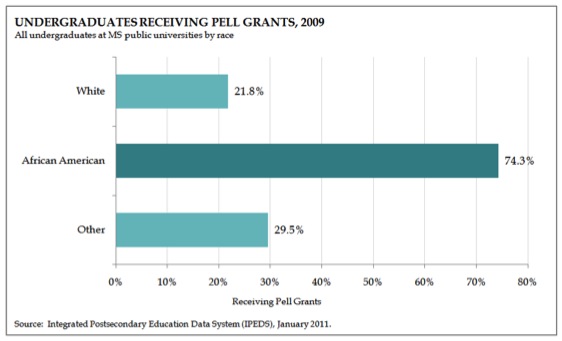Rising Costs Make Higher Education Harder to Reach For Middle and Low Income Mississippians
October 27th, 2011
A recent article and editorial point out the effects of a 7% increase in Mississippi’s university tuition last year. The increase adds to the amount Mississippi’s students take out in student loans or that individuals take out of pocket to cover costs. Tuition at the state’s historically black colleges and universities increased by a greater rate last year than tuition overall. Increases compensate for inadequate state support over the last few years.
Raising the cost of receiving a university education can have a particularly harsh effect on Mississippi’s middle and low income families. Pell grants are a key piece of providing support for students that might not otherwise have the means to attend college and pursue education that provides career opportunities for economic security after college.
In 2009, 24,593 students – or 42.3% of all university undergraduates- received the opportunity to attend and finance a portion of their education through Pell Grants. When tuition rises, Pell Grants cover a smaller portion of the cost for attending school, and calls for limiting the resources put towards funding Pell Grants would have a negative effect on the opportunity to access higher education for almost half of Mississippi’s university students.
Even slight increases in tuition are likely to have a substantial impact on Mississippi’s low income families. And data on Pell Grants for undergraduate students shows the Mississippi’s African American families are more likely than their classmates to access higher education through Pell support. Seventy-four percent (74%) of African American students in Mississippi’s universities required need-based financial aid to access higher education compared to 22% of white students. Of the 24,593 students receiving Pell Grants, 7,138 were white, 16,561 were African American and 894 were of another ethnicity (see chart).
Increases of tuition at Mississippi’s universities impact the cost of college and debt incurred by thousands of Mississippi students regardless of race. However, tuition increases and suggestions to reduce funding for Pell Grants will have a particularly adverse impact on Mississippi’s African American families.
With 42% of Mississippi’s university students receiving Pell support, increases in tuition and limits in Pell Grants limit access to opportunity and upward mobility to a large portion of the state’s youngest residents and future workforce. And when tuition increases at a faster rate than wages, higher education requires a larger portion of all families’ budgets.
It remains absolutely imperative that we restore investments in universities and protect Pell funding for the health of the state’s universities and for ensuring we keep pathways for economic mobility and economic security open for the all of Mississippi’s students.
Author: Sarah Welker, Policy Analyst





